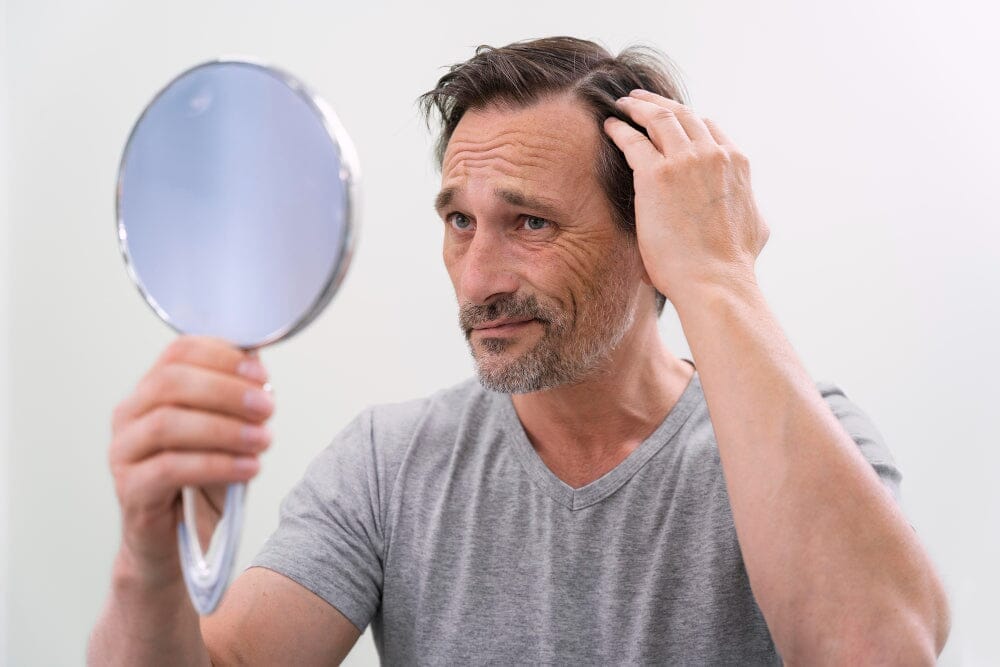
How to control hair fall for men
Time to read 6 min
Time to read 6 min
Hair fall is a complex area within healthcare as it is a symptom of several contributing parameters. While it is considered normal to lose around 50 to 100 strands a day, anything more than that requires testing and treatment. It is also important to treat hair loss as soon as possible so that you're able to control hair fall and stimulate hair growth immediately. The best approach is to start with the type of hair loss being experienced to diagnose hair fall problems with better clarity.
There are several signs of hair loss in men that should be medically reviewed if the problem escalates. By understanding the signs of hair loss, you can stop hair fall or reduce the speed at which hair loss is occurring
There are several factors that can cause hair fall and reduce the quality of otherwise healthy hair follicles. The leading factors are as follows -
While male pattern hair loss can be largely genetic, there are important strategies men can follow to control hair fall long-term.
Diet plays an important role in hair health management, which is why optimizing your diet can help. By eating a balanced meal and improving your supplementation, you can reduce the effects of lifestyle driven hair fall.
Smoking, excessive drinking, binge eating, and processed foods should be avoided to stop lifestyle-driven hair loss. Key changes, such as stress management, better sleep, exercise, and outdoor activities should be included to improve overall health markers.
Diseases, infections, and secondary conditions can cause hair loss as a symptom. You should get a complete test done to determine if your hair loss is caused due to an onset of a secondary condition.
Often we lose some of our essential oils through extended dryness, leading to an appearance of oily hair on the scalp. By following a consistent and high quality hygiene routine, men can prevent a potential scalp infection and improve hair quality.
By opting for organic and nutrient-rich hair products, we can strengthen the hair shaft while reducing hair fall. Additionally, using shampoos with green tea extracts can also help strengthen hair follicles in some cases. Also if you avoid brushing wet hair, then you can also reduce hair damage that can occur due to pulling.
Getting tested for hormonal imbalances can provide initial insight into whether your hair loss is caused due to this factor. The right medication restores hormonal balance in the body, which can improve hair growth.
Onion juice is one of the best home remedies for controlling hair fall. By rubbing onion juice on the scalp and letting it sit for 20 minutes, you can improve hair quality significantly. You can also add honey to the juice for additional nutrients.
Certain prescription medication can interfere with hair growth and development, which is why it is important to consult with your doctor about potential side effects.
You should get a complete DHT hair loss test done by MyDiagnostics.in. The test can help find out if there are toxins present in the body that can be impacting hair growth. You should get a hair analysis mineral test done to get an assessment of the quality of your follicles.
There are several hair loss treatment options that can work to treat extensive hair loss in men. Low level laser therapy, topical finasteride, minoxidil, and certain medications can help in treating hair loss in men. Oral medication prescribed by a doctor also promotes hair growth for some men.
While hair fall in men is fairly common, it is best to get tested to remove other possibilities such as infections, deficiencies, etc. It is also important to get tested in the case that you may be having a scalp infection or hair disorders.
It is important to focus on the essential reasons that cause hair loss in men. With male pattern hair loss being different from female pattern hair loss, it is important to optimize your diet and lifestyle to balance genetic effects. There are also several changes to your styling routine that you can focus on to avoid further hair loss.
Img src - https://pixabay.com/photos/food-coconut-fruit-healthy-3062139/
While there are genetic, lifestyle, nutritional, and hormonal balance related factors in hair regrowth, it is important to target the right ones to grow your hair follicles back. Male pattern baldness is not reversible in many cases where the genetic component is involved.
In this case, men can opt for hair transplant options or opt for medication to slow hair loss. Hair transplants are viable options, especially for men who have tried topical minoxidil and have not seen results.
*Medical Disclaimer - The following information is for educational purposes only. No information provided on this website, including text, graphic, and images, are intended as substitutes for professional medical advice. Please consult with your doctor about specific medical advice pertaining to your condition(s)

